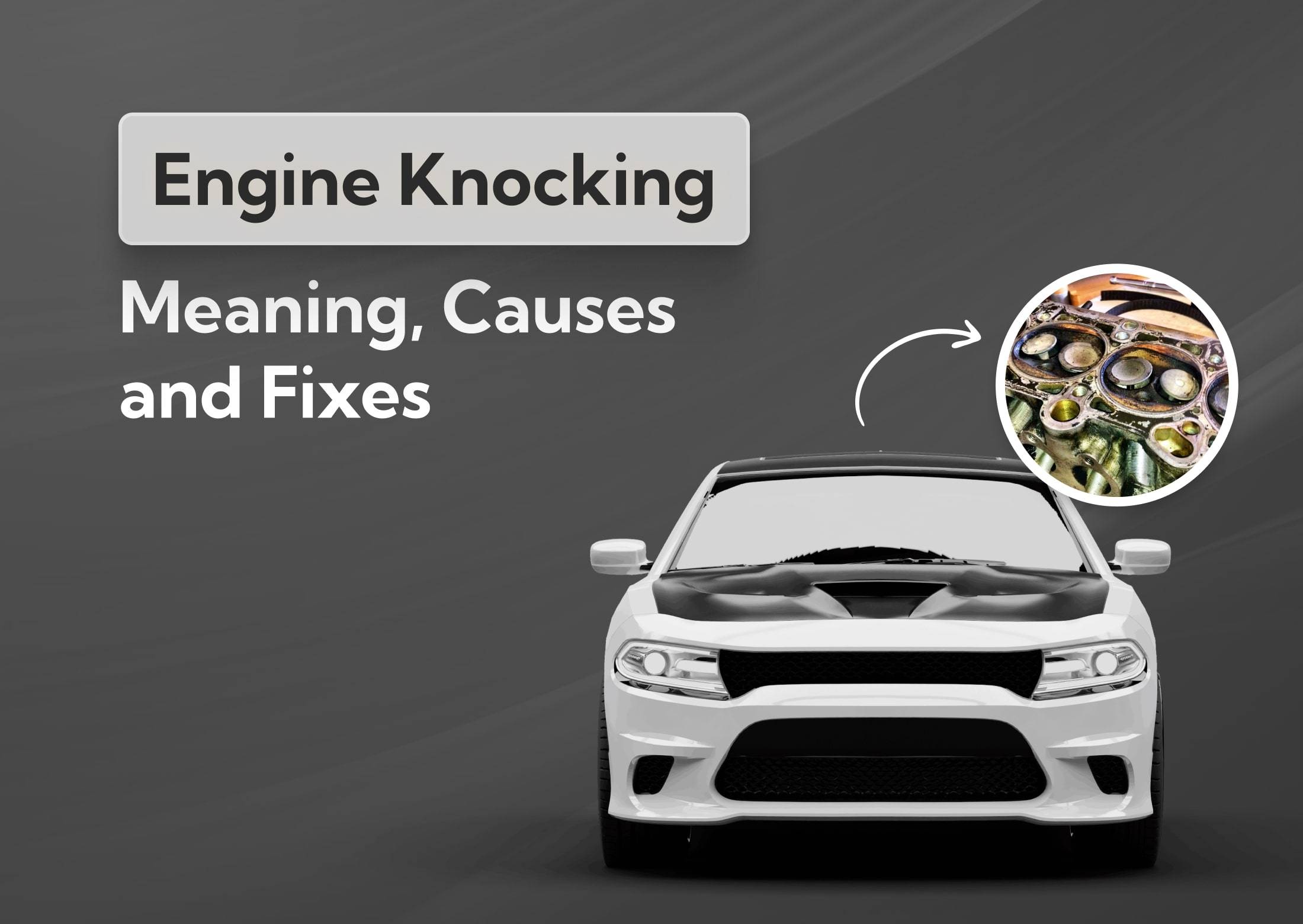Engine Knocking: Meaning, Causes and Fixes
If your engine has started making a sharp metallic tapping under the bonnet, that sound isn’t just annoying. It is your engine warning you something’s off in the combustion cycle. Catch the engine knocking early and you might fix it cheaply. Ignore it and you could be looking at a full rebuild.
Last updated: 17th January, 2026

Anthony Sharkey is COO at New Reg Limited (Car.co.uk, Trader.co.uk, Garage.co.uk), driving innovation in vehicle recycling, logistics, and customer experience.

Listen to this story
If your engine has ever made a knocking or pinging noise under the bonnet, you know the feeling. A quick jolt of panic. Is something loose? Is the engine about to quit on me? Do I pull over or just turn the music up and pretend everything’s fine?
Engine knocking usually means the fuel in your cylinders isn’t burning the way it should. Maybe you filled up with low-octane fuel at a dodgy station. Maybe the spark plugs are old and misfiring. Could be carbon buildup making a tiny mess inside the combustion chamber.
Now, cost. Sometimes a quick spark plug swap or higher-quality fuel sorts it. Fifty quid, done. Other times, it’s a worn sensor or timing issue that needs a mechanic’s touch. And worst-case scenarios like internal engine damage get into four-figure territory.
I’m not here to scare you, though. If you understand what causes knocking and know how to spot it early, you can usually put a stop to it before things get messy.
That’s what today’s article is all about.
What's in this article
- 4. How to fix engine knocking?
- 5. Cost to fix engine knocking
- 6. Typical costs based on vehicle type and severity of the knocking (UK, 2026)
- 7. Is it worth fixing or should I scrap my car?
- 8. How to fix engine knocking?
- 8.1 Switch to the correct octane fuel.
- 8.2 Replace faulty spark plugs.
- 8.3 Clean or replace fuel injectors.
- 8.4 Clean carbon deposits from the engine.
- 8.5 Adjust the ignition timing.
- 8.6 Cost to fix engine knocking
- 8.7 Spark plug replacement
- 8.8 Fuel system cleaning
- 8.9 Ignition timing adjustment
- 8.10 If timing is electronically controlled:
- 8.11 If timing components have failed:
- 8.12 Carbon cleaning or decarbonising
- 8.13 Engine rebuild or replacement
- 9. Typical costs based on vehicle type and severity of the knocking (UK, 2025)
- 10. Is it worth fixing or should I scrap my car?
What does engine knock sound like?
Engine knock sounds like a metallic tapping or pinging coming from under the bonnet. Almost like someone’s flicking a small hammer against the engine block. It’s quick, repetitive and sharp. You’ll hear it when you accelerate, climb a hill or the engine is working a bit harder than usual. And once you hear it, you can’t unhear it.
The tricky part is, cars produce a whole symphony of weird noises. So how do you pick a knock out from the crowd? Here’s how it compares to other common sounds:
- Ticking: Faster and lighter.
- Rattling: Sounds like something is shaking around.
- Hissing: You’ll hear escaping steam or a ‘snake’ under the bonnet.
- Grinding: Deeper and normally accompanied by vibrations.
- Squealing: More high-pitched.
To correctly identify engine knocking, listen for metallic sharpness during acceleration or uphill pulls. Turn off the radio and lower the driver window near walls to echo the sound back. And pay attention to whether the noise matches engine RPM, not road speed.
What causes engine knocking?
Engine knocking is primarily caused by fuel igniting unevenly inside the combustion chamber. In a healthy engine, the spark plug fires once per cycle, and the air–fuel mixture burns smoothly. When fuel quality, timing, deposits, or component wear throws that off, you get those small pinging noises.
It’s not just noise either. The causes of those noises actively rob power from the engine, increase fuel use and, if left unchecked, cause serious (sometimes irreversible) engine damage.
Let’s take a closer look at the specific causes of engine knocking.
Incorrect or low-octane fuel
Put simply: not all petrol is created equal. Engines that need a higher octane fuel rely on that fuel’s resistance to early ignition. If you fill up with petrol that ignites too easily, it’ll fire before the spark plug intends. That’s how the knocking starts.
Signs this is the issue:
- You hear knocks almost immediately after refuelling.
- Noise worsens under heavy acceleration.
To fix it, try switching to a higher-octane grade. We’re talking a small price jump for a big performance win.
What causes engine knocking?
Engine knocking is primarily caused by fuel igniting unevenly inside the combustion chamber. In a healthy engine, the spark plug fires once per cycle, and the air–fuel mixture burns smoothly. When fuel quality, timing, deposits, or component wear throws that off, you get those small pinging noises.
It’s not just noise either. The causes of those noises actively rob power from the engine, increase fuel use and, if left unchecked, cause serious (sometimes irreversible) engine damage.
Let’s take a closer look at the specific causes of engine knocking.
Incorrect or low-octane fuel
Put simply: not all petrol is created equal. Engines that need a higher octane fuel rely on that fuel’s resistance to early ignition. If you fill up with petrol that ignites too easily, it’ll fire before the spark plug intends. That’s how the knocking starts.
Signs this is the issue:
- You hear knocks almost immediately after refuelling.
- Noise worsens under heavy acceleration.
To fix it, try switching to a higher-octane grade. We’re talking a small price jump for a big performance win.
Bad spark plugs
Spark plugs control the exact moment combustion happens. If one’s worn out or misfiring, combustion doesn’t happen when it’s supposed to. Fuel might ignite late or in random bursts. Cue the knocking soundtrack. If this is the cause, you’ll also notice poor fuel economy, rough idling and sluggish acceleration.
Replacing your spark plugs costs little and is often the first (and easiest) fix to try. You should do so every 30,000 to 60,000 miles, but it depends on the exact car. Your mechanic will know best here.
Carbon deposits and build-up
Over time, carbon builds on pistons and valves. It’s tiny at first, then layered like burnt toast flakes stuck everywhere. This reduces cylinder space and raises compression, making the fuel more likely to ignite too early. It’s surprisingly common in cars that do lots of short trips and stop-start city driving.
You can prevent it with regular servicing and the occasional fuel system cleaner, but if it’s already bad, a professional decarbonisation will probably be needed.
Incorrect air-fuel mixture
If the engine runs too lean (not enough fuel for the available air), combustion temperatures rise. Higher heat equals higher risk of knocking.
Typical causes:
- Faulty sensors (like the MAF or oxygen sensor)
- Weak fuel pump or clogged injectors
- Air leaks
Modern engines are clever enough to adjust, but only within limits. If you’ve got a check engine light along with knocking, this could be the reason. That said, it’s one of those issues where a mechanic’s diagnostic tools really help pinpoint the root cause.
To fix it, you’ll need a fuel injector cleaning or engine tuning.
Overly advanced ignition timing
If the spark fires too early, the combustion forces push against the piston while it’s still moving up. That sudden pressure spike causes knock. Sometimes, this is the result of poor ECU tuning or a timing chain that’s stretched just enough to throw things out of sync. I see it particularly often in modified engines.
When timing is advanced too far, those violent pressure spikes can damage pistons, bearings and even the head gasket if left long enough. It’s like forcing an argument before the other person has finished speaking. Eventually something snaps.
Adjusting timing usually means plugging into the ECU and pulling the ignition advance back a degree or two, or updating a bad tune if the car’s modified. In older engines with a distributor, you physically rotate it slightly until the engine runs smooth again.
How to fix engine knocking?
Fix engine knocking first by confirming the cause. Start with the quick and affordable fixes like spark plugs or better fuel, then work your way into the deeper stuff if the noise sticks around. And remember: the longer you drive with knock, the more expensive the fix becomes.
Switch to the correct octane fuel.
Low-octane petrol ignites too easily under high pressure. Engines that need 97 or 99 RON will knock if you give them cheap juice. If the knock appears after refuelling or if it’s more noticeable under load (e.g. hills), this is probably the issue.
Quick fix:
- If you have a high-performance engine, run the tank nearly dry first (check manual to see if this is needed for your car).
- If not, go straight to refilling with the correct grade at a reputable station.
- Take a short motorway run and listen again.
Now… if you accidentally fill up with lower octane fuel, it’s usually safe to top up with the correct octane and let the two mix, so long as the engine is running smoothly and you avoid heavy acceleration. That dilution raises the overall octane and prevents knock.
High-performance engines that require premium are more sensitive, though. So a good rule of thumb is if the owner’s manual says “Premium recommended” and not “Premium required”, dilution by topping up is usually fine. If it says “Premium required” or if you hear knocking, do the near-empty approach and refill with the right octane ASAP.
Replace faulty spark plugs.
This is your easiest win. Old, dirty or wrong-spec spark plugs can fire late or not at all. When that happens, the fuel ignites unevenly and creates the pressure spikes you hear as knocking. If this is the issue, you might have engine misfires and rough idling as well as engine knocking.
There are a few ways they go bad: long-term wear over tens of thousands of miles, cheap plug materials eroding early, oil contamination from worn piston rings and poor servicing history.
To fix them:
- Buy the exact spec listed in your handbook.
- Remove the ignition coils.
- Unscrew the old plugs.
- Inspect for damage or soot build-up.
- Install new plugs with correct gap and torque settings.
- Clear misfire codes with diagnostics.
It’s DIY friendly if you can follow instructions and have a torque wrench. Not DIY if plugs sit deep in a cramped engine bay (e.g. on a BMW).
Clean or replace fuel injectors.
If the fuel injectors clog up, the engine runs lean. Lean burn equals high combustion temperatures. High heat equals knock. This happens when you use low-quality fuel, do lots of city driving or don’t push the engine above low RPMs very often.
What a mechanic will do:
- Run a pressurised cleaning solution through the fuel rail.
- Remove injectors for ultrasonic cleaning if you need to.
- Test spray patterns to confirm the fix.
As an added benefit, this’ll improve your engine efficiency since it facilitates a more complete combustion.
Now… a pour-in fuel system cleaner is DIY-safe. But I wouldn’t recommend anything beyond that for anyone except the pros since you are dealing with high fuel pressure.
Clean carbon deposits from the engine.
Carbon buildup reduces space inside the combustion chamber and boosts compression. Then the fuel ignites sooner than planned. And that metallic pinging noise follows shortly behind. This happens when you take a lot of short trips where the engine never warms up, when you use cheap fuel that burns dirty and when you have EGR issues.
How the pros clean it:
Chemical intake cleaning service.
Combustion chamber cleaning solution.
Walnut blasting on direct injection engines if deposits are heavy.
If carbon deposits were the cause, you’ll hear a noticeable drop in knock plus smoother acceleration after your trip to the garage. And to prevent it from happening in the future, give the engine a proper motorway run occasionally.
Adjust the ignition timing.
Engine knocking sometimes happens when the spark is firing earlier than the engine is ready. That is called advanced timing. It makes the piston fight combustion rather than follow it. If the timing isn’t precise and you ignore this, the results are a damaged piston crown, hammered bearings and head gasket failure.
How you approach the process depends on whether you’re driving a modern or older car.
- Modern cars: Tune the ECU back to manufacturer spec using diagnostics.
- Older cars: Rotate the distributor slightly and check timing with a strobe light.
That said, do not touch timing without proper tools and knowledge. Get a tech who knows what they are doing for both diagnosis and fixing the problem.
Cost to fix engine knocking
How much your engine knocking costs to fix largely depends on what is causing the knock, how long the problem has been happening, the type of car you drive and the labour rates in your area.
If it’s something simple like spark plugs or fuel quality, you’ll walk away with a quick, low-cost fix. If the knock has already caused internal engine wear or damaged components, the price jumps very quickly.
The sooner you diagnose it, the more likely you will be dealing with a small bill instead of something that ruins your month.
Spark plug replacement
Spark plugs are the cheapest and fastest fix for engine knock. According to Who Can Fix My Car, here in the UK you are usually looking at £100 to £250 all in once labour and diagnostics are included.
Of course, it depends slightly based on the type of car you drive, the type of spark plugs you need and how many hours it takes to complete the job. In general, it takes between 30 minutes (if your car has a 4-cylinder engine) and 2 hours (if it’s got a 6/8-cylinder engine) to complete.
Here’s a look at the current averages across the UK:
Fuel system cleaning
A basic fuel system clean, where a pressurised cleaner runs through the injectors, usually starts around £20 to £50 for a DIY additive or £80 to £200 at a garage with professional kit. This is normally enough for mild buildup if the car has port injection.
If the injectors are badly clogged or delivering uneven spray, the mechanic may remove them for ultrasonic cleaning. This can cost £200 to £400 depending on the number of injectors and how easy it is for them to remove the parts.
Replacement is the step up. Standard petrol port-injection units often cost around £120 to £200 per injector fitted, depending on the car. More advanced petrol direct-injection or diesel common-rail injectors can climb to £300 to £800+ each due to higher pressure systems and trickier access.
Premium brands like BMW, Mercedes, and Land Rover typically sit at the upper end of those ranges thanks to pricier components and greater labour time. And if a full set needs replacing (usually recommended), the total bill might push into four-figure territory.
A quick way to think about it:
- Mild clogging: Cleaning solves it and does not break the bank.
- Severe clogging or bad spray pattern: Cleaning plus labour creeps up.
- Injector failure or leaking: Replacement becomes the only realistic fix.
Ignition timing adjustment
How you approach this depends on whether the timing is electronically controlled and if timing components have failed.
If timing is electronically controlled:
Modern petrol engines no longer use a distributor you can adjust by hand. Instead, the engine control unit (ECU) automatically manages ignition timing using data from crankshaft and camshaft sensors.
If timing seems off in these systems, it usually indicates a sensor fault or ECU calibration issue, not something that can be “tuned” manually.
A diagnostic check to identify the problem and reset the timing parameters typically costs £80 to £150, depending on the workshop and how complicated the system is.
If timing components have failed:
When ignition timing is out because the mechanical components have slipped or failed, the issue is usually a broken timing belt or chain, along with tensioners or guides. Fixing this requires replacing those components and re-aligning the engine timing marks.
- Timing belt replacement: £300 to £800+ depending on accessibility and vehicle design.
- Timing chain replacement: £600 to £1,500+ since it requires partial engine disassembly.
Carbon cleaning or decarbonising
There are a few ways to clear carbon out of your engine, each with its own price point:
- Fuel system additives: Cheap and cheerful. You pour them into the tank and hope they remove light deposits. It costs £10 to £25. Good for prevention or very mild buildup but will not fix heavy knocks.
- Professional intake cleaning: A technician feeds a specialised cleaner into the intake while the engine runs. It targets carbon on the intake valves and in the upper cylinders. The cost is higher (£90 to £200 depending on engine size and how dirty things are).
- Walnut blasting (for direct-injection engines): This is the heavy-duty way. The mechanic removes the intake manifold and fires crushed walnut shells at the valves to strip carbon back to clean metal. The £200 to £500+ cost range reflects this.
Engine rebuild or replacement
This is the scenario nobody wants. If you’ve ignored it long enough, the violent pressure spikes inside the cylinders batter pistons, damage valve surfaces, crack ring lands and score the cylinder walls. At that point, you aren’t paying to fix knocking. You are paying to fix the damage knocking caused.
If internal components are still salvageable, a mechanic may recommend a rebuild:
- Engine stripped down
- Damaged parts replaced
- Surfaces machined back to spec
- Bearings, gaskets and seals renewed
- Everything torqued back together like new
For that, it’ll be anywhere from £1,000 to £2.500+ depending on parts, labour hours and engine size.
If the damage is too severe or the car is older, a replacement engine might make more financial sense. Used engines with reasonable mileage range £1,500 to £5,000. Reconditioned or brand-new units go higher.
Typical costs based on vehicle type and severity of the knocking (UK, 2026)
Is it worth fixing or should I scrap my car?
As you can probably tell, engine knock is either a simple, cheap fix or a total money pit. The decision comes down to the age and value of your car plus how serious the cause is. If you catch the issue early, the smart move is almost always to repair. Leave it too long and you’re better off putting that money toward your next set of wheels.
When to consider repairing engine knocking
Repairs are worth it when:
- The knock has just started and the car still drives fine.
- Diagnostics show a cheap and simple culprit like plugs, fuel or light carbon buildup.
- The car has decent resale value or is still early in its life.
- You rely on it daily and replacing a car would be a bigger disruption.
If it’s knocking only under load or acceleration, a mechanic confirms no internal damage yet and the repair restores performance and prevents long-term damage, you should definitely fix it. Think of these as early warning fixes. Pay a little now to avoid paying a lot later.
When to consider scrapping your car
It makes more sense to scrap your car when the maths no longer adds up. If the cost of repair is heading into four figures and your car is only worth three, pouring money into it becomes more emotional than logical.
Consider scrapping when:
- A timing belt or chain failure has already caused valve or piston damage.
- The mechanic recommends a rebuild or replacement.
- The car is older with high mileage and low resale value.
- You’re facing multiple major issues at once, not just knocking.
According to our internal data from scrapping more than 130,000 cars, most cars scrapped are between 16 and 20 years old and have 125,000+ miles on them. If you’re within that threshold and get hit with a big repair bill, we’ll collect your car free of charge and pay you on the spot.
What the experts say

William Fletcher MBE
Bad spark plugs
Spark plugs control the exact moment combustion happens. If one’s worn out or misfiring, combustion doesn’t happen when it’s supposed to. Fuel might ignite late or in random bursts. Cue the knocking soundtrack. If this is the cause, you’ll also notice poor fuel economy, rough idling and sluggish acceleration.
Replacing your spark plugs costs little and is often the first (and easiest) fix to try. You should do so every 30,000 to 60,000 miles, but it depends on the exact car. Your mechanic will know best here.
Carbon deposits and build-up
Over time, carbon builds on pistons and valves. It’s tiny at first, then layered like burnt toast flakes stuck everywhere. This reduces cylinder space and raises compression, making the fuel more likely to ignite too early. It’s surprisingly common in cars that do lots of short trips and stop-start city driving.
You can prevent it with regular servicing and the occasional fuel system cleaner, but if it’s already bad, a professional decarbonisation will probably be needed.
Incorrect air-fuel mixture
If the engine runs too lean (not enough fuel for the available air), combustion temperatures rise. Higher heat equals higher risk of knocking.
Typical causes:
- Faulty sensors (like the MAF or oxygen sensor)
- Weak fuel pump or clogged injectors
- Air leaks
Modern engines are clever enough to adjust, but only within limits. If you’ve got a check engine light along with knocking, this could be the reason. That said, it’s one of those issues where a mechanic’s diagnostic tools really help pinpoint the root cause.
To fix it, you’ll need a fuel injector cleaning or engine tuning.
Overly advanced ignition timing
If the spark fires too early, the combustion forces push against the piston while it’s still moving up. That sudden pressure spike causes knock. Sometimes, this is the result of poor ECU tuning or a timing chain that’s stretched just enough to throw things out of sync. I see it particularly often in modified engines.
When timing is advanced too far, those violent pressure spikes can damage pistons, bearings and even the head gasket if left long enough. It’s like forcing an argument before the other person has finished speaking. Eventually something snaps.
Adjusting timing usually means plugging into the ECU and pulling the ignition advance back a degree or two, or updating a bad tune if the car’s modified. In older engines with a distributor, you physically rotate it slightly until the engine runs smooth again.
How to fix engine knocking?
Fix engine knocking first by confirming the cause. Start with the quick and affordable fixes like spark plugs or better fuel, then work your way into the deeper stuff if the noise sticks around. And remember: the longer you drive with knock, the more expensive the fix becomes.
Switch to the correct octane fuel.
Low-octane petrol ignites too easily under high pressure. Engines that need 97 or 99 RON will knock if you give them cheap juice. If the knock appears after refuelling or if it’s more noticeable under load (e.g. hills), this is probably the issue.
Quick fix:
- If you have a high-performance engine, run the tank nearly dry first (check manual to see if this is needed for your car).
- If not, go straight to refilling with the correct grade at a reputable station.
- Take a short motorway run and listen again.
Now… if you accidentally fill up with lower octane fuel, it’s usually safe to top up with the correct octane and let the two mix, so long as the engine is running smoothly and you avoid heavy acceleration. That dilution raises the overall octane and prevents knock.
High-performance engines that require premium are more sensitive, though. So a good rule of thumb is if the owner’s manual says “Premium recommended” and not “Premium required”, dilution by topping up is usually fine. If it says “Premium required” or if you hear knocking, do the near-empty approach and refill with the right octane ASAP.
Replace faulty spark plugs.
This is your easiest win. Old, dirty or wrong-spec spark plugs can fire late or not at all. When that happens, the fuel ignites unevenly and creates the pressure spikes you hear as knocking. If this is the issue, you might have engine misfires and rough idling as well as engine knocking.
There are a few ways they go bad: long-term wear over tens of thousands of miles, cheap plug materials eroding early, oil contamination from worn piston rings and poor servicing history.
To fix them:
- Buy the exact spec listed in your handbook.
- Remove the ignition coils.
- Unscrew the old plugs.
- Inspect for damage or soot build-up.
- Install new plugs with correct gap and torque settings.
- Clear misfire codes with diagnostics.
It’s DIY friendly if you can follow instructions and have a torque wrench. Not DIY if plugs sit deep in a cramped engine bay (e.g. on a BMW).
Clean or replace fuel injectors.
If the fuel injectors clog up, the engine runs lean. Lean burn equals high combustion temperatures. High heat equals knock. This happens when you use low-quality fuel, do lots of city driving or don’t push the engine above low RPMs very often.
What a mechanic will do:
- Run a pressurised cleaning solution through the fuel rail.
- Remove injectors for ultrasonic cleaning if you need to.
- Test spray patterns to confirm the fix.
As an added benefit, this’ll improve your engine efficiency since it facilitates a more complete combustion.
Now… a pour-in fuel system cleaner is DIY-safe. But I wouldn’t recommend anything beyond that for anyone except the pros since you are dealing with high fuel pressure.
Clean carbon deposits from the engine.
Carbon buildup reduces space inside the combustion chamber and boosts compression. Then the fuel ignites sooner than planned. And that metallic pinging noise follows shortly behind. This happens when you take a lot of short trips where the engine never warms up, when you use cheap fuel that burns dirty and when you have EGR issues.
How the pros clean it:
- Chemical intake cleaning service.
- Combustion chamber cleaning solution.
- Walnut blasting on direct injection engines if deposits are heavy.
If carbon deposits were the cause, you’ll hear a noticeable drop in knock plus smoother acceleration after your trip to the garage. And to prevent it from happening in the future, give the engine a proper motorway run occasionally.
Adjust the ignition timing.
Engine knocking sometimes happens when the spark is firing earlier than the engine is ready. That is called advanced timing. It makes the piston fight combustion rather than follow it. If the timing isn’t precise and you ignore this, the results are a damaged piston crown, hammered bearings and head gasket failure.
How you approach the process depends on whether you’re driving a modern or older car.
- Modern cars: Tune the ECU back to manufacturer spec using diagnostics.
- Older cars: Rotate the distributor slightly and check timing with a strobe light.
That said, do not touch timing without proper tools and knowledge. Get a tech who knows what they are doing for both diagnosis and fixing the problem.
Cost to fix engine knocking
How much your engine knocking costs to fix largely depends on what is causing the knock, how long the problem has been happening, the type of car you drive and the labour rates in your area.
If it’s something simple like spark plugs or fuel quality, you’ll walk away with a quick, low-cost fix. If the knock has already caused internal engine wear or damaged components, the price jumps very quickly.
The sooner you diagnose it, the more likely you will be dealing with a small bill instead of something that ruins your month.
Spark plug replacement
Spark plugs are the cheapest and fastest fix for engine knock. According to our insights, here in the UK you are usually looking at £100 to £250 all in once labour and diagnostics are included.
Of course, it depends slightly based on the type of car you drive, the type of spark plugs you need and how many hours it takes to complete the job. In general, it takes between 30 minutes (if your car has a 4-cylinder engine) and 2 hours (if it’s got a 6/8-cylinder engine) to complete.
Here’s a look at the current averages across the UK:
Fuel system cleaning
A basic fuel system clean, where a pressurised cleaner runs through the injectors, usually starts around £20 to £50 for a DIY additive or £80 to £200 at a garage with professional kit. This is normally enough for mild buildup if the car has port injection.
If the injectors are badly clogged or delivering uneven spray, the mechanic may remove them for ultrasonic cleaning. This can cost £200 to £400 depending on the number of injectors and how easy it is for them to remove the parts.
Replacement is the step up. Standard petrol port-injection units often cost around £120 to £200 per injector fitted, depending on the car. More advanced petrol direct-injection or diesel common-rail injectors can climb to £300 to £800+ each due to higher pressure systems and trickier access.
Premium brands like BMW, Mercedes, and Land Rover typically sit at the upper end of those ranges thanks to pricier components and greater labour time. And if a full set needs replacing (usually recommended), the total bill might push into four-figure territory.
A quick way to think about it:
- Mild clogging: Cleaning solves it and does not break the bank.
- Severe clogging or bad spray pattern: Cleaning plus labour creeps up.
- Injector failure or leaking: Replacement becomes the only realistic fix.
Ignition timing adjustment
How you approach this depends on whether the timing is electronically controlled and if timing components have failed.
If timing is electronically controlled:
Modern petrol engines no longer use a distributor you can adjust by hand. Instead, the engine control unit (ECU) automatically manages ignition timing using data from crankshaft and camshaft sensors.
If timing seems off in these systems, it usually indicates a sensor fault or ECU calibration issue, not something that can be “tuned” manually.
A diagnostic check to identify the problem and reset the timing parameters typically costs £80 to £150, depending on the workshop and how complicated the system is.
If timing components have failed:
When ignition timing is out because the mechanical components have slipped or failed, the issue is usually a broken timing belt or chain, along with tensioners or guides. Fixing this requires replacing those components and re-aligning the engine timing marks.
- Timing belt replacement: £300 to £800+ depending on accessibility and vehicle design.
- Timing chain replacement: £600 to £1,500+ since it requires partial engine disassembly.
Carbon cleaning or decarbonising
There are a few ways to clear carbon out of your engine, each with its own price point:
- Fuel system additives: Cheap and cheerful. You pour them into the tank and hope they remove light deposits. It costs £10 to £25. Good for prevention or very mild buildup but will not fix heavy knocks.
- Professional intake cleaning: A technician feeds a specialised cleaner into the intake while the engine runs. It targets carbon on the intake valves and in the upper cylinders. The cost is higher (£90 to £200 depending on engine size and how dirty things are).
- Walnut blasting (for direct-injection engines): This is the heavy-duty way. The mechanic removes the intake manifold and fires crushed walnut shells at the valves to strip carbon back to clean metal. The £200 to £500+ cost range reflects this.
Engine rebuild or replacement
This is the scenario nobody wants. If you’ve ignored it long enough, the violent pressure spikes inside the cylinders batter pistons, damage valve surfaces, crack ring lands and score the cylinder walls. At that point, you aren’t paying to fix knocking. You are paying to fix the damage knocking caused.
If internal components are still salvageable, a mechanic may recommend a rebuild:
For that, it’ll be anywhere from £1,000 to £2.500+ depending on parts, labour hours and engine size.
If the damage is too severe or the car is older, a replacement engine might make more financial sense. Used engines with reasonable mileage range £1,500 to £5,000. Reconditioned or brand-new units go higher.
Typical costs based on vehicle type and severity of the knocking (UK, 2025)
Is it worth fixing or should I scrap my car?
As you can probably tell, engine knock is either a simple, cheap fix or a total money pit. The decision comes down to the age and value of your car plus how serious the cause is. If you catch the issue early, the smart move is almost always to repair. Leave it too long and you’re better off putting that money toward your next set of wheels.
When to consider repairing engine knocking
Repairs are worth it when:
- The knock has just started and the car still drives fine.
- Diagnostics show a cheap and simple culprit like plugs, fuel or light carbon buildup.
- The car has decent resale value or is still early in its life.
- You rely on it daily and replacing a car would be a bigger disruption.
If it’s knocking only under load or acceleration, a mechanic confirms no internal damage yet and the repair restores performance and prevents long-term damage, you should definitely fix it. Think of these as early warning fixes. Pay a little now to avoid paying a lot later.
When to consider scrapping your car
It makes more sense to scrap your car when the maths no longer adds up. If the cost of repair is heading into four figures and your car is only worth three, pouring money into it becomes more emotional than logical.
Consider scrapping when:
- A timing belt or chain failure has already caused valve or piston damage.
- The mechanic recommends a rebuild or replacement.
- The car is older with high mileage and low resale value.
- You’re facing multiple major issues at once, not just knocking.
According to our internal data from scrapping more than 130,000 cars, most cars scrapped are between 16 and 20 years old and have 125,000+ miles on them. If you’re within that threshold and get hit with a big repair bill, we’ll collect your car free of charge and pay you on the spot.
Frequently asked questions
You can, but you really shouldn’t. Knocking is your engine shouting that something is off inside the cylinders. Keep driving, and the noise won’t magically go away. In fact, it usually gets worse and more expensive the longer you delay. If you hear it, get it checked sooner rather than later.
Short version: temperatures rise, pressure spikes smash into piston surfaces, bearings get hammered and the timing components suffer. If ignored, knock turns a cheap fix into an engine rebuild or even a full replacement. It is the ultimate example of ignore now, pay later.
Stick to the basics. They actually work. Use the right fuel grade your car recommends, change spark plugs and filters on schedule, keep injectors and the fuel system clean, give the engine proper motorway runs every now and then and fix engine warning lights early rather than hoping they vanish.
Engine knocking can absolutely happen in newer cars. Modern engines push high compression for power and efficiency. If fuel quality dips, timing components wear or carbon piles up, knock can happen on even a nearly new motor. The difference is newer engines have knock sensors that try to correct the problem. But that’s damage control, not a cure.
Engine knocking means the fuel is not burning smoothly or fully. The engine loses efficiency and you burn more petrol to produce the same power. You end up filling up more often while the car feels slower at the same time. It is a lose-lose situation.
Yes. If pressure spikes hammer the engine components for long enough, metal bends and breaks. Pistons crack. Cylinder walls score. Valves get smacked out of shape. When that sort of damage sets in, repairs get really expensive.
About Car.co.uk

Share on
Latest news & blogs










